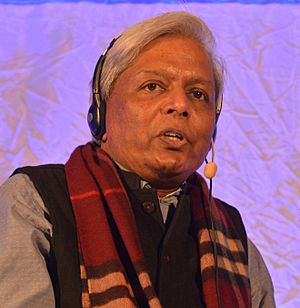K. Vijayraghavan facts for kids
Quick facts for kids
Krishnaswamy Vijayraghavan
|
|
|---|---|

Vijayraghavan in December 2017
|
|
| 3rd Principal Scientific Adviser to the Government of India | |
| In office April 2018 – 2 April 2022 |
|
| President | Ram Nath Kovind |
| Prime Minister | Narendra Modi |
| Preceded by | Rajagopala Chidambaram |
| Succeeded by | Ajay K. Sood |
| Personal details | |
| Born | 3 February 1954 |
| Nationality | India |
| Alma mater | Indian Institute of Technology Kanpur, Tata Institute of Fundamental Research |
| Awards | Padma Shri Fellow of the Royal Society Infosys Prize Shanti Swarup Bhatnagar Prize Foreign Associate, US National Academy of Sciences. |
| Scientific career | |
| Fields | Genetics Neurogenetics |
| Institutions | The National Centre for Biological Sciences |
Dr. Krishnaswamy Vijayraghavan, born on February 3, 1954, is a very respected scientist from India. He used to be a professor and director at a big science center called the National Centre for Biological Sciences.
From 2018 to 2022, he was the main science advisor to the Indian government. This important role meant he helped the government make decisions using scientific knowledge. He has received many important awards for his work, like the Padma Shri from India and being chosen as a fellow of the Royal Society in the UK.
Contents
Early Life and School
Krishnaswamy Vijayraghavan studied chemical engineering at IIT Kanpur. He earned his first degree in 1975 and a master's degree in 1977.
He then went on to get his Ph.D. in molecular biology in 1983. He did this research at the Tata Institute of Fundamental Research. After his Ph.D., he worked as a researcher at the California Institute of Technology in the United States from 1984 to 1988.
Career in India
In 1988, Dr. Vijayraghavan returned to India. He joined the Tata Institute of Fundamental Research. In 1992, he helped start the National Centre for Biological Sciences (NCBS) in Bangalore.
He became a very important part of NCBS. Today, he is an emeritus professor there. This means he is a retired professor who is still highly respected.
What He Studied
Dr. Vijayraghavan is an expert in developmental biology, genetics, and neurogenetics. These fields study how living things grow and develop. They also look at how genes work and how the nervous system forms.
His research mainly focused on how the nervous system and muscles develop. He wanted to understand how these systems work together to control movement. He used tiny fruit flies, called Drosophila melanogaster, to study this.
By studying fruit flies, his work helped scientists understand how genes guide the connections between nerves and muscles. This research showed how these connections control how animals move.
Other Important Roles
Besides his research, Dr. Vijayraghavan has held other key positions. He was the secretary of the Department of Biotechnology (DBT) in India from 2013 to 2018. This department helps promote science and technology in India.
He also served on the board of governors for the Okinawa Institute of Science and Technology. He is a senior editor for a science journal called eLife. In 2024, he led a committee that advised the Prime Minister's Office on reforms for the DRDO, which is India's defense research organization.
Awards and Achievements
Dr. Vijayraghavan has received many honors for his scientific work.
- 1997: He was chosen as a fellow of the Indian Academy of Sciences.
- 1998: He received the Shanti Swarup Bhatnagar Prize for Science and Technology. This is one of India's highest science awards.
- 1999: He became an honorary faculty member at the Jawaharlal Nehru Centre for Advanced Scientific Research. He also became a fellow of the Indian National Science Academy.
- 2003: He received the Distinguished Alumnus Award from IIT Kanpur, his old university.
- 2006: He was awarded the J. C. Bose Fellowship.
- 2010: He was elected a fellow of TWAS, which is an academy for sciences in developing countries.
- 2012: He received the H. K. Firodia Award for his important work in life sciences. In the same year, he became a Fellow of the Royal Society in the UK.
- 2013: The President of India gave him the Padma Shri. This is a very high civilian award in India.
- 2014: He was elected as a Foreign Associate of the US National Academy of Sciences.
- 2018: He was appointed as the Principal Scientific Adviser to the Government of India.
- 2021: He was elected to the American Philosophical Society.
 | Delilah Pierce |
 | Gordon Parks |
 | Augusta Savage |
 | Charles Ethan Porter |

